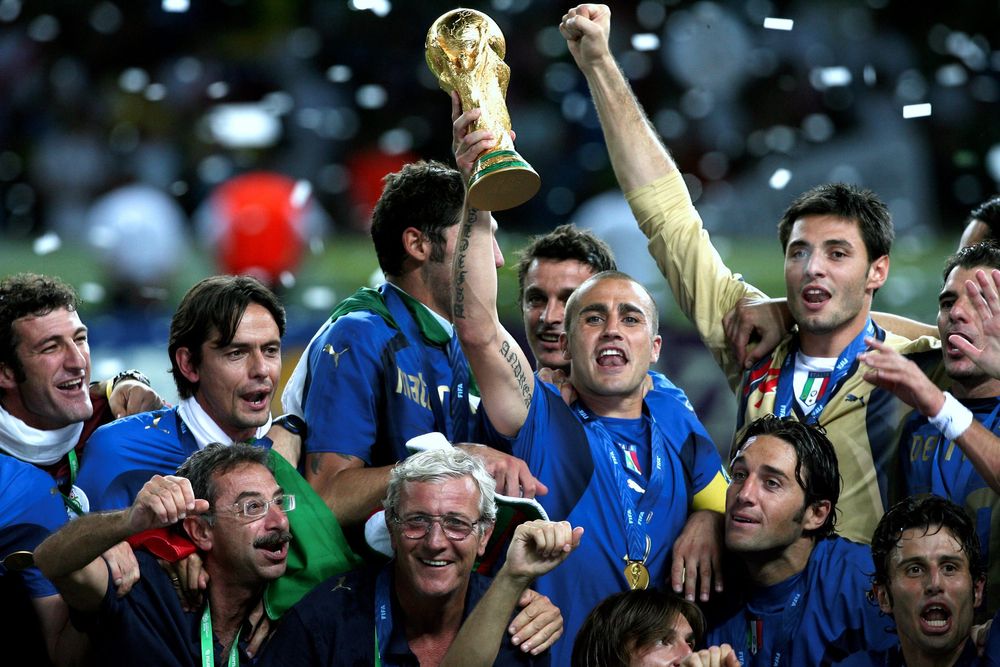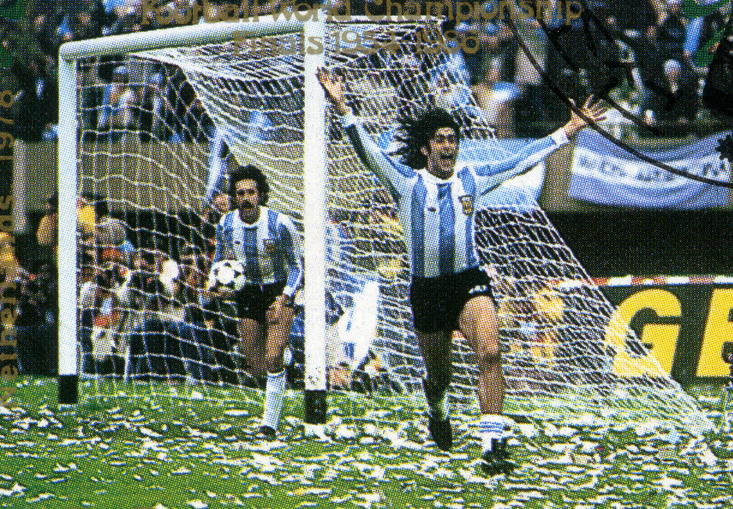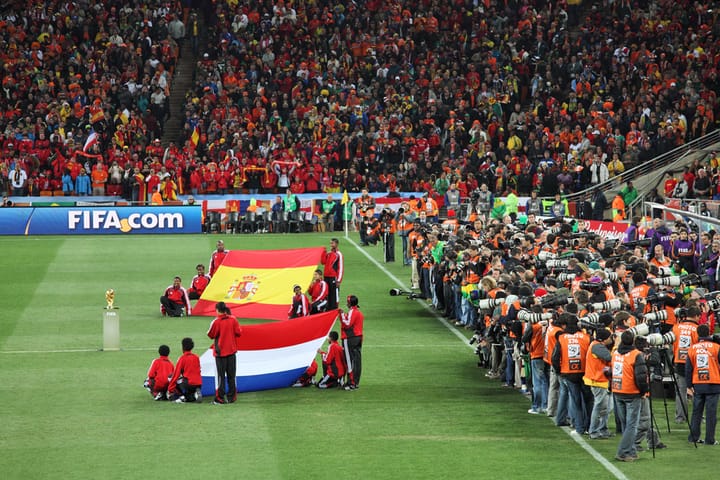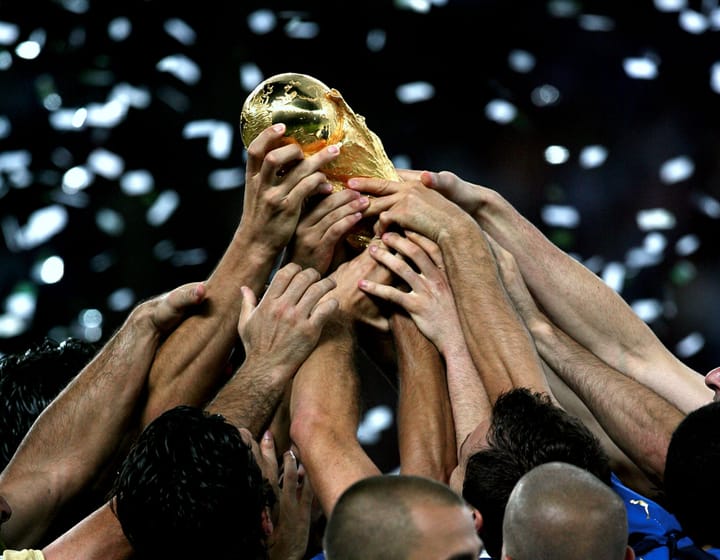Italy's Glorious Legacy: A Journey Through The Azzurri's Four FIFA World Cup Victories
Italy's national soccer team, also known as the Azzurri, has a proud history in the FIFA World Cup, having won the prestigious tournament four times. In this article, we highlight each of these four wins.

The chronicle of Italian soccer is studded with a rich tapestry of memorable moments, legendary players, and triumphant victories. Among these, the national team's four World Cup wins stand as towering milestones, not just in the annals of Italian soccer but in the global soccer narrative. From the early victories of the 1930s during the nascent stages of the World Cup, through the passionate triumph of 1982, to the dramatic penalty shootout victory in 2006, each World Cup triumph has brought a different flavor, a unique story, and a particular sense of joy to the Italian Tifosi. Each victory also underscores Italy's soccer philosophy, a combination of tactical discipline, defensive resilience, and flair for creativity.
This article will take you on a journey through the Azzurri's historic quartet of World Cup victories, highlighting the significant events, influential figures, and defining moments that have shaped Italy's storied World Cup legacy.
1934 - World Cup Win #1
The 1934 FIFA World Cup, the second ever held, took place in Italy from May 27 to June 10. It was the first World Cup where teams had to qualify to participate, and as the host nation, Italy was automatically granted a spot.
Unlike the inaugural 1930 World Cup, which followed a round-robin format, the 1934 World Cup introduced a knockout format that was used throughout the tournament.
In the Round of 16, Italy faced the United States and won decisively, 7-1, with Angelo Schiavio scoring a hat trick.
In the quarterfinals, Italy went on to face Spain. The match ended in a 1-1 draw after extra time. Giuseppe Meazza scored the only goal in a replay game the following day, which Italy won 1-0 because there were no penalty shootouts in those days.
In the semifinals, Italy played Austria and secured a 1-0 victory, with Enrique Guaita scoring the only goal of the match.
In the final, Italy faced Czechoslovakia at the National Stadium in Rome, in front of a crowd of 50,000 spectators. The Czechs took the lead in the 70th minute, but Italy's Raimundo Orsi equalized 10 minutes later. The match went into extra time, and Angelo Schiavio scored the winning goal, securing Italy's 2-1 victory and their first World Cup title.
This victory in 1934 marked Italy's arrival as a significant force in international soccer, a status they would cement by winning the next World Cup in 1938. It's also worth noting that the 1934 World Cup took place during the era of Benito Mussolini's fascist regime, and the victory was used as a propaganda tool by the regime to boost national pride and promote its political ideologies.
1938 - World Cup Win #2
The 1938 FIFA World Cup was the third edition of the tournament and was held in France from June 4 to June 19. Italy entered the tournament as the defending champions, having won the World Cup in 1934 on home soil.
In their first match (round of 16), Italy played against Norway and secured a 2-1 victory in extra time with goals from Pietro Ferraris and Silvio Piola.
In the quarterfinals, Italy then faced the host nation, France, and defeated them convincingly with a scoreline of 3-1. Gino Colaussi and Silvio Piola each scored, with Piola netting two goals.
In the semis, Italy played Brazil and won 2-1, with goals from Gino Colaussi and Giuseppe Meazza.
The final saw Italy face Hungary in Paris. Italy won 4-2, securing their second World Cup title. Gino Colaussi and Silvio Piola each scored twice in the match.
The 1938 World Cup was managed by Vittorio Pozzo, who also guided Italy to their first World Cup triumph in 1934, making him the only coach to win two World Cups.
Notably, this World Cup took place on the eve of World War II, and Italy played all of its matches in a black shirt, which was part of the national fascist uniform at the time. This controversial choice demonstrated how sport, particularly a global event like the World Cup, could be used for political messaging.
1982 - World Cup Win #3
The 1982 FIFA World Cup, the 12th edition of the tournament, was held in Spain from June 13 to July 11. Italy's campaign in this World Cup was particularly memorable as it marked the end of a 44-year wait for their third title, having previously won in 1934 and 1938.
Here are the key details of Italy's successful campaign in 1982:
Italy had a slow start to the tournament, drawing all three of their group stage matches. They tied with Poland (0-0), Peru (1-1), and Cameroon (1-1). However, they advanced to the second round based on goal difference.
The tournament format at the time included a second round of group matches. Italy found its form in this round. They defeated Argentina 2-1, with Marco Tardelli and Antonio Cabrini scoring, and then beat Brazil in an iconic 3-2 match. Paolo Rossi scored a hat trick in the game against Brazil, which is considered one of the greatest World Cup matches of all time.
Italy faced Poland and secured a comfortable 2-0 victory, with both goals scored by Paolo Rossi.
The final saw Italy face West Germany in Madrid. Italy won 3-1 to secure their third World Cup title. Paolo Rossi opened the scoring, and Marco Tardelli and Alessandro Altobelli added one each. Tardelli's passionate celebration after scoring the second goal is one of the most iconic moments in World Cup history.
The 1982 World Cup saw the emergence of Paolo Rossi, who had recently returned from a two-year ban from soccer. Rossi won the Golden Boot as the tournament's top scorer with six goals and also received the Golden Ball as the best player of the tournament.
The team was managed by Enzo Bearzot, who is considered one of the greatest Italian coaches. The 1982 World Cup is remembered for Italy's tactical discipline, solid defense, and effective counter-attacking style.
2006 - World Cup Win #4
The 2006 FIFA World Cup, the 18th edition of the tournament, was held in Germany from June 9 to July 9. Italy's victory in this World Cup marked their fourth title, placing them second only to Brazil in terms of overall victories.
In the group stage, Italy won 2-0 against Ghana in their first match, drew 1-1 with the United States in the second, and finished the group stage with a 2-0 victory over the Czech Republic.
In the round of 16, Italy faced Australia and secured a narrow 1-0 victory thanks to a last-minute penalty kick converted by Francesco Totti.
In the quarterfinals, Italy played Ukraine and secured a 3-0 victory with a goal from Gianluca Zambrotta and two goals from Lucas Toni.
Italy faced Germany in the semi-finals and won 2-0 after extra time, with goals from Fabio Grosso and Alessandro Del Piero.
The final saw Italy face France at the Olympiastadion in Berlin. The match ended 1-1 after extra time, with Marco Materazzi scoring Italy's goal in response to Zinedine Zidane's earlier penalty for France. In the penalty shootout, Italy won 5-3, with Fabio Grosso scoring the decisive penalty.
This World Cup is particularly remembered for the dramatic incident in the final when France's Zinedine Zidane headbutted Marco Materazzi after a verbal exchange and was sent off in his last-ever professional match.
The Italian team in 2006, under the management of Marcello Lippi, was known for its solid defense, which conceded only two goals throughout the tournament (excluding the penalty shootout). They showcased a balanced style of play, combining defensive strength with attacking creativity. The Italian captain, Fabio Cannavaro, had an outstanding tournament and was later awarded the Ballon d'Or for that year.
Each of these victories represents a unique chapter in Italy's soccer history, reflecting different styles of play, tactics, key players, and broader trends within the sport.




